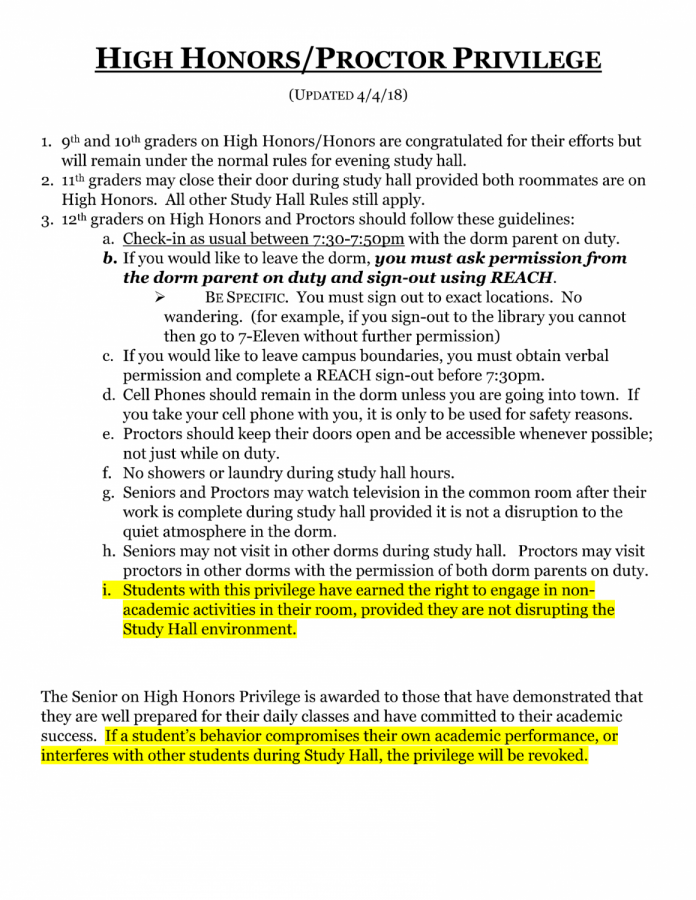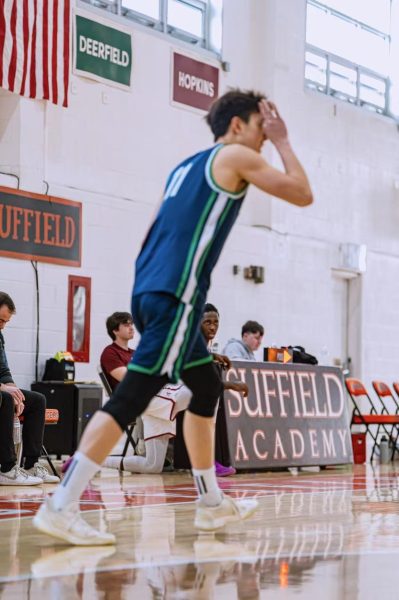High-Honors Privileges and the Junior Class
Earning high honors at Williston removes study hall burdens for seniors, while affording door closure to juniors meeting the same academic criteria.
High honors is defined as holding a weighted GPA above a 92%. As a senior, if you meet that threshold at the end of a trimester, the next trimester you can partake in “nonacademic activities” during study hall, which entail playing video games, sleeping, or even making a Dunkin’ run.
Juniors, on the other hand, get to close their doors during study hall if they attain the same 92 average. With their doors closed in study hall, a student could seemingly do whatever her or she likes in their room. Unfortunately for some students, this privilege is limited by the need for both occupants of a room to have high honors to close the door. This feat is rarely accomplished. There is only one junior pair in Ford who both achieved high honors this fall trimester. Furthermore, juniors on high honors must leave their phones outside their rooms.
Emile Savoie and Badou Ba are a rare junior duo to find high honors success in the same semester and will now be enjoying their studies with the door closed. What makes their accomplishment even more impressive is that they are both new this year.
This desire for phones to be part of the high honors privilege was brought up by Emile, Badou, and Roscoe Eade, another new junior who reached high honors.
“I think I should have the privilege of having my phone since I’ve shown I’m capable of getting strong grades. I should also be able to do things on my computer,” Roscoe confidently stated.
He said the privileges he thought he should be granted would motivate him to be successful in school. It is mostly the prospects of getting into college next year and knowing the importance of junior year grades that have motivated him to this point.
Russell Bollag-Miller, a new English teacher and Ford dorm parent this year, thinks that the current privileges are enough for students, and allow them to stay focused while also feeling rewarded for their efforts.
“I think the closed door is a fair symbolic gesture, because it shows that you’ve had the discipline and focus to get your work done,” he said, starkly adding that “you are given more responsibility and you can either flounder or succeed and that will dictate if you get that same privilege in future trimesters.”
After his thoughtful comments, he jokingly remarked on the conversation revolving solely around a student’s door being opened or closed.
“This is all very philosophical for just a closed door,” said Bollag-Miller.
He went on to repeat the well-worn adage that life is not always fair. He thinks students who reach high-honors without their roommates should simply be motivated to help their roommate obtain the same recognition so the privilege can be enjoyed.
“It’s not always fair, and maybe this encourages more collaboration between roommates.”
Andrew Syfu, a member of the Williston faculty, has served in the History and Global Studies department at Williston for 15 years. He is now the Middle School Dean and head dorm parent of Ford Hall, a position which he has held for nine years.
Syf, as he is colloquially known, has stated that he is open to new ideas for high-honors privileges.
He thinks that not all high honors recipients are equal in achievement, as he believes that student who take more honors and AP level classes while achieving high honors have completed a more difficult task than a student in mostly standard classes garnering high honors recognition.
“Not all high honors are created equally,” he said.
He believes that the current study hall set up may need some time spent incubating amongst deans and teachers at the school. Taking away phones and limiting distractions forcefully may not teach students to limit these distractions themselves once in college.
Penn is a three-year senior from New Haven, Connecticut. He enjoys covering campus news and community events, and loves to chat with all members of the...











